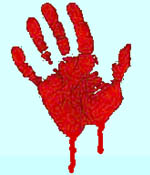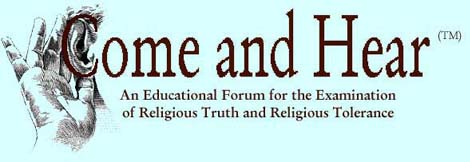
New America | |||||||||||||||||||||||||||||||||||||||||
 There are changes in the wind. Some people may be happy, some may be unhappy. Let's go directly to the Talmud to see its laws on some social concerns.
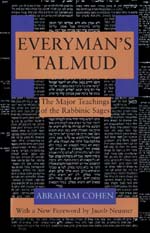
Rev. Dr. Abraham Cohen is the author of Everyman's Talmud and translator of Sotah and Abodah Zarah for the Soncino Edition of the Talmud. In Everyman's Talmud, Rev. Dr. Cohen writes:  "… while the man might he trusted not to abuse his power, the woman, if virtuous, would only in the rarest circumstances actually desire a divorce." — Maurice Simon, translator of Tractate Gittin (20) 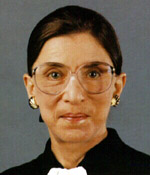
Ruth Bader Ginsburg received the American Jewish Committee Award for Distinguished Jewish American and Israeli Feminists in January 2000 at a ceremony in the Israeli Knesset. (17) 
The late Virginia Snitow received the American Jewish Committee Award for Distinguished Jewish American and Israeli Feminists in January 2000 at a ceremony in the Israeli Knesset. (17) 
Letty Cottin Pogrebin received the American Jewish Committee Award for Distinguished Jewish American and Israeli Feminists in January 2000 at a ceremony in the Israeli Knesset. (17) 
Francine Klagsbrun received the American Jewish Committee Award for Distinguished Jewish American and Israeli Feminists in January 2000 at a ceremony in the Israeli Knesset. (17) 
Lilly Rivlin co-founded Seder Sisters in 1976, a ceremony that mimics the Passover Seder with substitute words, events, and names chosen to highlight "women's issues." 
Susan Weidman Schneider received the American Jewish Committee Award for Distinguished Jewish American and Israeli Feminists in January 2000 at a ceremony in the Israeli Knesset. (17) 
Rabbi Simeon J. Maslin served as served as President of the Central Conference of American Rabbis from 1995-1997. In a 1993 pamphlet, he wrote: 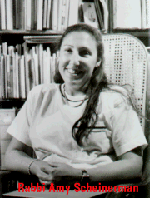
Rabbi Amy Scheinerman, of Bolton Street Synagogue in Baltimore, Maryland. 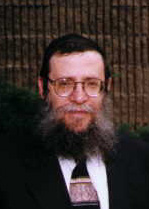
Rabbi Noson Gurary is the Executor Director of the Hasidic Chabad of Buffalo, New York, and founder of the National Institute for Judaic Law, the purpose of which is to educate American courts and law schools about Judaic law. 
You can help in the battle for Truth, Justice, and the American Way! Fight the forces of censorship and suppression of the Talmud, and bring about understanding between peoples of different faiths. 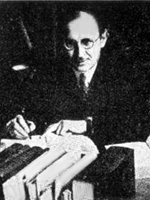
Rabbi Dr. Isidore Epstein, editor of the Soncino Talmud, states: |
Wives Become Divorcees is the second in a two-part series on Talmud marriage and divorce laws. The first part is Talmud Daughters Become Talmud Wives. (1) We hope this introduction to Talmud divorce laws serves as an entry point for your own research. (29) In Talmud Daughters Become Talmud Wives, Rabbi Dr. Epstein, the editor of the Soncino Talmud, told us that the kethubah — the "deed of marriage settlement" instituted by the Sages — protected a wife against hasty divorce. Given the right of the husband to divorce the wife at will, the Sages felt that the kethubah safeguarded a woman's marital security (see Talmud Daughters Become Talmud Wives: "Protection of the Kethubah"). (Note: In the following Talmud excerpts, we sometimes omit footnotes and non-germane text. Omissions of text are indicated by ellipses (…). The full text and all footnotes are available through the hot links that follow the excerpts, along with the text of the entire tractates. Now, at Come and Hear™, you can judge the Talmud fairly and in context.) No Kethubah for Bodily DefectsDespite the protection of the kethubah, it is relatively easy for a husband to get rid of a wife without paying. Physical defects can justify her being divorced without receiving kethubah. MISHNAH. … [IF A WOMAN WAS BETROTHED] ON CONDITION THAT SHE HAS NO BODILY DEFECTS, AND SHE WAS FOUND TO HAVE SUCH DEFECTS, HER BETROTHAL IS INVALID. IF HE MARRIED HER WITHOUT MAKING ANY CONDITIONS AND SHE WAS FOUND TO HAVE BODILY DEFECTS, SHE MAY BE DIVORCED WITHOUT A KETHUBAH. ALL DEFECTS WHICH DISQUALIFY PRIESTS (1) DISQUALIFY WOMEN ALSO. (2) — Babylonian Talmud, Tractate Kethuboth 72b Rev. Dr. Israel W. Slotki, Talmud scholar and translator of this section of the Tractate Kethuboth, amplifies the text with these footnotes:
— Rev. Dr. Slotki Blemishes Big and SmallRev. Dr. Slotki refers us to Leviticus 21:17 for a description of defects which disqualify men from the priesthood, which same defects deprive a wife of her kethubah. For full context, we have begun our excerpt at Leviticus 21:16 and extended it to Leviticus 21:21.
The New International Version renders the same passage as follows:
So then, a woman who is hunchbacked, blind, lame, disfigured, deformed, or has a crippled foot or hand or an eye defect … or damaged sexual organs may be divorced without her kethubah. — Bad Breath, Perspiration, MolesThe Sages go on to discuss this Mishnah in the following Gemara, and expand the legal rulings. Other physical defects that can deny a wife her kethubah include excessive perspiration and bad breath. We have omitted the footnotes in the following. To study them, please follow the link at the end of the excerpt. GEMARA. … ALL DEFECTS WHICH DISQUALIFY etc. A Tanna taught: To these were added [excessive] perspiration, a mole and offensive breath. Do these, then, not cause a disqualification in respect of priests? Surely we have learned, 'The old, the sick and the filthy' and we have also learned, 'These defects whether permanent or transitory, render human beings unfit [for the Temple service]! — R. Jose b. Hanina replied: This is no contradiction. The former refers to perspiration that can be removed; the latter, to perspiration that cannot be removed. — Babylonian Talmud, Tractate Kethuboth 75a — Scars from Dog Bites, a Harsh VoiceScars from dog bites and a harsh voice can also trigger the divorce of a wife without her kethubah. GEMARA. … R. Hisda said: I heard the following statement from a great man (And who is he? R. Shila). If a dog bit her and the spot of the bite turned into a scar [such a scar] is considered a bodily defect. — Babylonian Talmud, Tractate Kethuboth 75a — Breasts Too Far ApartHaving breasts too far apart can trigger the divorce of a woman without her kethubah. GEMARA. … R. Nathan of Bira learnt: [The space] of one handbreadth between a woman's breasts. R. Aha the son of Raba intended to explain in the presence of R. Ashi [that this statement meant that '[the space of] a handbreadth' is to [a woman's] advantage, but R. Ashi said to him: This was taught in connection with bodily defects. And what space [is deemed normal]? Abaye replied: [A space of] three fingers. — Babylonian Talmud, Tractate Kethuboth 75a — Groom Should Have InspectedThe Sages argue about the relative responsibilities of the father and the groom for a bride's imperfections. Some argue he should have had his female relatives inspect the betrothed woman's body in a local bath-house before he made his deal with the father. The woman's body is compared to a "field that was inundated." MISHNAH. IF SHE WAS AFFLICTED WITH BODILY DEFECTS WHILE SHE WAS STILL IN HER FATHER'S HOUSE, HER FATHER MUST PRODUCE PROOF THAT THESE DEFECTS AROSE AFTER SHE HAD BEEN BETROTHED AND [THAT, CONSEQUENTLY, IT WAS THE] HUSBAND'S FIELD THAT WAS INUNDATED. IF SHE CAME UNDER THE AUTHORITY OF HER HUSBAND, THE HUSBAND MUST PRODUCE PROOF THAT THESE DEFECTS WERE UPON HER BEFORE SHE HAD BEEN BETROTHED AND [THAT CONSEQUENTLY] HIS BARGAIN WAS MADE IN ERROR. THIS IS THE RULING OF R. MEIR. THE SAGES, HOWEVER, RULED: THIS APPLIES ONLY TO CONCEALED BODILY DEFECTS; [75b] BUT IN RESPECT OF DEFECTS THAT ARE EXPOSED HE CANNOT ADVANCE ANY VALID PLEA. AND IF THERE WAS A BATH-HOUSE IN THE TOWN HE CANNOT ADVANCE ANY VALID PLEA EVEN AGAINST CONCEALED BODILY DEFECTS, BECAUSE HE [IS ASSUMED TO HAVE HAD HER] EXAMINED BY HIS WOMEN RELATIVES. — Babylonian Talmud, Tractate Kethuboth 75a-75b None of this quite fits into our current concept of prenuptial romance in America. Currently, bride and groom vow to love each other "for better or worse, in sickness and in health." The Talmudic concept might take some getting used to. No Kethubah for Behavioral ProblemsA wife who speaks too loudly inside her own home, who has intercourse with her husband when she is menstruating, who feeds her husband the wrong food or commits other religious-culinary offenses, who goes out with head uncovered, who curses her husband's parents in his presence — these wives may be divorced without a kethubah. MISHNAH. THESE ARE TO BE DIVORCED WITHOUT RECEIVING THEIR KETHUBAH: A WIFE WHO TRANSGRESSES THE LAW OF MOSES OR [ONE WHO TRANSGRESSES] JEWISH PRACTICE. AND WHAT IS [REGARDED AS A WIFE'S TRANSGRESSION AGAINST] THE LAW OF MOSES? FEEDING HER HUSBAND WITH UNTITHED FOOD, HAVING INTERCOURSE WITH HIM DURING THE PERIOD OF HER MENSTRUATION, NOT SETTING APART HER DOUGH OFFERING, OR MAKING VOWS AND NOT FULFILLING THEM. AND WHAT [IS DEEMED TO BE A WIFE'S TRANSGRESSION AGAINST] JEWISH PRACTICE? GOING OUT WITH UNCOVERED HEAD, SPINNING IN THE STREET OR CONVERSING WITH EVERY MAN. ABBA SAUL SAID: [SUCH TRANSGRESSIONS INCLUDE] ALSO THAT OF A WIFE WHO CURSES HER HUSBAND'S PARENTS IN HIS PRESENCE. R. TARFON SAID: ALSO ONE WHO SCREAMS. AND WHO IS REGARDED A SCREAMER? A WOMAN WHOSE VOICE CAN BE HEARD BY HER NEIGHBOURS WHEN SHE SPEAKS INSIDE HER HOUSE. — Babylonian Talmud, Tractate Kethuboth 72a The ScreamerThe Sages discuss that Mishnah in the following Gemara. What is meant by "one who screams?" GEMARA. … R. TARFON SAID: ALSO ONE WHO SCREAMS. What is meant by a screamer? — Rab Judah replied in the name of Samuel: One who speaks aloud (10) on marital matters. In a Baraitha it was taught: [By screams was meant a wife] whose voice (11) during her intercourse in one court can be heard in another court. But should not this, then, (12) have been taught in the Mishnah (13) among defects? (14) — Clearly we must revert to the original explanation. (15) — Babylonian Talmud, Tractate Kethuboth 72b Rev. Dr. Israel W. Slotki, Talmud scholar and translator of this section of the Tractate Kethuboth, amplifies the text with these footnotes:
— Rev. Dr. Slotki So then, Rab Judah is of the opinion that a woman who expresses herself "aloud" on matters that pertain to the family could trigger divorce without kethubah. She is distinguished from the woman who screams in pain during intercourse. That woman is presumed to have a physical defect, and may be divorced without kethubah on that account. For further discussion of such women, see Really, Really, Kosher Sex. Divorce and VirtueTractate Gittin contains the laws of divorce. In his Introduction to the Tractate, Talmud scholar and Talmud translator Maurice Simon states: One more point will probably strike the modern reader — the apparent unfairness of the Talmudic law of divorce towards the woman. The husband can practically at any time get rid of the wife against her will; the wife cannot release herself from the husband against his will except under certain conditions when the Beth din can compel him to give her a Get. This is certainly the theory, but in practice this inequality was, in the view of the Rabbis, more apparent than real. They assumed, and rightly so, that both for a man and a woman married life was under almost any conditions preferable to single, and therefore while the man might he trusted not to abuse his power, the woman, if virtuous, would only in the rarest circumstances actually desire a divorce. — Maurice Simon (20) If Mr. Simon is correct, that "both for a man and a woman married life was under almost any conditions preferable to single," we might expect the divorce law to reflect that parity of interest. Instead, the ability of a man to unilaterally divorce his wife is clearly to his advantage. Mr. Simon infers that only a lack of virtue in a woman would lead her to want a divorce, but that leaves an open question: What would lead a man to want a divorce — and would that indicate personal virtue, or lack thereof? Delivery of the GetWhen a husband wishes to divorce his wife, he must serve her with a document called a Get. The Tractate Gittin enumerates unusual but legitimate methods for delivering the Get. — The Get may be delivered by surpriseMISHNAH. IF HE SAID TO HER, TAKE THAT BOND, OR IF SHE FOUND IT BEHIND HIM AND READ IT AND IT TURNED OUT TO BE HER GET, IT IS NO GET, UNTIL HE SAYS TO HER, THERE IS YOUR GET. IF HE PUT IT INTO HER HAND WHILE SHE WAS ASLEEP AND WHEN SHE WOKE UP SHE READ IT AND FOUND IT WAS HER GET, IT IS NO GET UNTIL HE SAYS TO HER, THAT IS YOUR GET. — Babylonian Talmud, Tractate Gittin 78a — The Get May Be Delivered Air MailMISHNAH. IF SHE WAS STANDING ON A ROOF AND HE THREW IT UP TO HER, AS SOON AS IT REACHES THE AIRSPACE OF THE ROOF, SHE IS DIVORCED. IF HE WAS ABOVE AND SHE BELOW AND HE THREW IT TO HER, ONCE IT HAS LEFT THE SPACE OF THE ROOF, EVEN THOUGH [IMMEDIATELY AFTERWARDS] THE WRITING WAS EFFACED1 OR IT WAS BURNT,2 SHE IS DIVORCED. — Babylonian Talmud, Tractate Gittin 79a — A Get May Be ThrownA man may throw the Get at his wife. Depending on where it lands, the couple may or may not be divorced. If it lands nearer to her, they are divorced. If it lands nearer to him, they are not divorced. If it lands half way between them, they are both divorced and not divorced. MISHNAH. IF SHE WAS STANDING ON PUBLIC GROUND AND HE THREW IT TO HER, IF IT LANDS NEARER TO HER SHE IS DIVORCED, BUT IF IT LANDS NEARER TO HIM SHE IS NOT DIVORCED. IF IT LANDS MIDWAY, SHE IS DIVORCED AND NOT DIVORCED. — Babylonian Talmud, Tractate Gittin 78a In the Gemara, the Sages discuss the possibility of a dog running off with the Get, and the legal implications such an event would have: GEMARA. … R. Eliezer says: Even though it is nearer to her than to him and a dog came and ran off with it, she is not divorced.' She is not divorced, you say? How long is she to go on keeping it? No; what he means to say is this: If it is nearer to her than to him, yet so placed that if a dog came and tried to make off with it he could save it but she could not, she is not divorced. Samuel said to Rab Judah: Shinena, it must be so near that she can stoop down and pick it up, but do you not actually [declare it valid] until it comes into her hand. — Babylonian Talmud, Tractate Gittin 78b Possible ScenarioConsider this scenario made possible by Talmud divorce law: The husband notifies his wife that he is divorcing her by throwing the decree at her. The woman retrieves the Get from the ground where it has landed. By the time she can read it and determine its content, her former husband may be returning to his home, where she no longer lives. If she is lucky, or if her husband is feeling generous, she has a kethubah; otherwise he may use any of a dozen loopholes to deny it to her. Any money or property she has found or earned during her marriage now belongs to him. Is this the direction in which American women want to go? Beth Din May Enforce DivorceThere are some conditions under which a Beth din may force a husband to divorce his wife. These conditions are debatable, and indeed, were hotly debated at the time of the Sages. The first Mishnah of Kethuboth 77a opens the subject. MISHNAH. A MAN IN WHOM BODILY DEFECTS HAVE ARISEN CANNOT BE COMPELLED TO DIVORCE [HIS WIFE]. R. SIMEON B. GAMALIEL SAID: THIS APPLIES ONLY TO MINOR DEFECTS, BUT IN RESPECT OF MAJOR DEFECTS HE CAN BE COMPELLED TO DIVORCE HER. — Babylonian Talmud, Tractate Kethuboth 77a Now comes a second Mishnah: MISHNAH. THE FOLLOWING ARE COMPELLED TO DIVORCE [THEIR WIVES]: A MAN WHO IS AFFLICTED WITH BOILS, OR HAS A POLYPUS, OR GATHERS [OBJECTIONABLE MATTER] OR IS A COPPERSMITH OR A TANNER, WHETHER THEY WERE [IN SUCH CONDITIONS OR POSITIONS] BEFORE THEY MARRIED OR WHETHER THEY AROSE AFTER THEY HAD MARRIED. AND CONCERNING ALL THESE R. MEIR SAID: ALTHOUGH THE MAN MADE A CONDITION WITH HER [THAT SHE ACQUIESCES IN HIS DEFECTS] SHE MAY NEVERTHELESS PLEAD, 'I THOUGHT I COULD ENDURE HIM, BUT NOW I CANNOT ENDURE HIM.' THE SAGES, HOWEVER, SAID: SHE MUST ENDURE [ANY SUCH PERSON] DESPITE HER WISHES, THE ONLY EXCEPTION BEING A MAN AFFLICTED WITH BOILS, BECAUSE SHE [BY HER INTERCOURSE] WILL ENERVATE HIM. — Babylonian Talmud, Tractate Kethuboth 77a The Sages explain the meaning of "who gathers" in the following Gemara. The Mishnah refers to a husband who collects dog manure for use in his tanning business. GEMARA. … WHO GATHERS. What [is meant by one] WHO GATHERS? — Rab Judah replied: One who gathers dogs' excrements. — Babylonian Talmud, Tractate Kethuboth 77a The discussion is continued through to folio 78a. Some of the issues not discussed are immorality of the husband, infidelity of the husband, and cruelty to the wife. Please study the Come and Hear™ hypertext and draw your own conclusions. The Suspected WomanUnder Talmud law, if a man suspects his wife has been unfaithful but has no hard evidence of her infidelity, the wife may clear herself by submitting to a trial by ordeal. This trial consists of drinking "bitter water." If she is innocent, the drink is harmless; but if she is guilty, it kills her in a horrible fashion. For the trial, the suspected woman (the sotah) is brought to the Temple. The priest asks her how she pleads. If she says, "Guilty" or refuses the trial, she is divorced without her kethubah. MISHNAH. … THE FOLLOWING DO NOT DRINK AND DO NOT RECEIVE THE MARRIAGE SETTLEMENT: SHE WHO SAYS 'I AM UNCLEAN', WHEN WITNESSES CAME [AND TESTIFIED] THAT SHE HAD MISCONDUCTED HERSELF, AND SHE WHO SAYS 'I REFUSE TO DRINK'. — Babylonian Talmud, Tractate Sotah 24a If she says, "Innocent," the priest strips her to the waist, puts her on public display, and holds her up to public ridicule. She is then given "bitter water" to drink, which consists (allegedly) of Temple dust and water. If the sotah is guilty of infidelity, her belly swells, her face turns green, her eyes protrude, etc., and she dies. See Introduction to the Tractate Sotah. See also Sentence and Execution: "Poisoning With 'Bitter Water'" and Accusation and Trial: "Women Stripped to the Waist And Publicly Displayed." Given the details of this trial by ordeal, we suspect many women would just plead guilty and go away quietly without their kethuboth, regardless of the truth. Accusing one's wife of infidelity appears to be another mechanism at the disposal of a man who wants to get rid of a wife without paying the kethubah. Legal Limbo for WivesAn article carried by the Jewish Bulletin of Northern California in 2002 tells how the Talmud divorce laws are playing out in contemporary America. As you read, remember that the women who suffer live on American soil. NEW YORK — An international grass-roots organization has won the backing of major Orthodox rabbis and organizations around the world to help ease the plight of women whose husbands refuse them a Jewish divorce. — Jewish Bulletin of Northern California (25) Some husbands use a legal device that enables them to be remarried, while holding their wives in a marital limbo. One of the biggest loopholes that has been used recently to block women from obtaining gets is the heter me'ah rabbonim, which literally means "exception of 100 rabbis." — Jewish Bulletin of Northern California (25) Why don't these women, these agunot, go to an American court to settle the question? Because these women are Orthodox Jews, and they are using rabbinical courts to settle their legal disputes. They are living on American soil, but not under American law. See The Talmud Lives for Jews; they may be excommunicated if they take their husbands to Gentile court. Talmud Divorce in IsraelIn Israel, jurisdiction over divorce is effectively in the hands of rabbinical courts. The Israel Religious Action Center (IRAC) reports: Israeli society has given the monopoly in matters involving marriage and divorce to the halacha (Jewish law) and the activities of the rabbinical courts in these matters are a multi-disciplinary laboratory that studies various crucial questions. — Israel Religious Action Center(24) The IRAC report validates another from the late Virginia Snitow's group, Women to Women. WTW tells us the divorce courts are not just rabbinical courts — they are Orthodox rabbinical courts. In 1979 Virginia received a call for help from Israeli women for funds to pay the rent on the only shelter for abused women in Israel. "Jewish men don't beat their wives" said the incredulous Snitow. She soon learned how wrong she was … and a group called US/Israel Women to Women was born … Orthodox women face a different problem in Israel. Although it is ostensibly a secular state, Israeli law is interpreted by one stream of Judaism, the Orthodox. Getting a divorce in Israel is at the discretion of the husband. If the husband denies the divorce, then that ends the discussion. These women who are called agunat, are frequently compelled to remain in abusive situations. Some find refuge in shelters where WTW assists them through court proceedings. — WomensNewsOnline.com (27) This from the Jerusalem Post: Although state courts can determine custody and property division, rabbinical courts have sole jurisdiction over divorce for all Jewish Israelis, religious or not. — Jerusalem Post, reprinted by Max Morrison Legal Aid (3) Case HistoriesThe plight of wives living under Jewish law is publicized from time to time in Israeli newspapers. Many cases concern women whose husbands refuse to give them a divorce. Here is a case publicized in The Jerusalem Post in 1999. The Jerusalem Post reporter gives the wife the pseudonym "H". Technically, H., 43 and a mother of two, is a mesurevet get, a woman whose husband refuses to give her a divorce, and not an aguna. In modern parlance, aguna has come to include all women who can't get a religious divorce, not just a woman whose husband has disappeared. H.'s husband lives in Israel, but you wouldn't know it from his absence from their court hearings … — The Jerusalem Post (3) H.'s rabbinical court advocate presented her case, and for thirteen months she waited for the rabbis to reach a decision. Finally the court issued a declaration stating the man should divorce his wife. The Jerusalem Post tells us the man simply ignored the order, and the wife "waits on." (3) Haaretz carried the story of another woman whose husband refused her a divorce. The woman was eventually helped by attorney Susan Weiss. Weiss tells us about her client's case. In the following, "Y.S." are the reporter's initials. "It was one of the most shocking rulings I'd ever heard. They claimed I hadn't proved that he was unfaithful, although we had a tape of him confessing. The court said the confession was not a statement but a question ("I cheated on my wife?"). They also ruled that even if he had been unfaithful or violent, they couldn't force him to give a get because he had not been forewarned [according to Jewish law, a person can be punished only if he has been warned by two witnesses - Y.S.]. Since we were talking about the High Rabbinical Court, there was no other forum for me to appeal to. The woman petitioned the High Court, but the justices said they couldn't interfere in the decisions of the rabbinical court." — Haaretz.com (4) Not a VictoryA May 2001 Jerusalem family court decision has been represented as a big breakthrough for women under Jewish law; but to us, it seems more like business as usual. The case involved a husband who refused to give his wife a divorce (Get) after a decade of living apart. The husband had been ordered by a rabbinical court to grant the divorce, but he ignored the order. The wife filed a civil lawsuit arguing that she should be granted damages because the husband was withholding her right to remarry, have children, and determine her own destiny. Judge Ben Zion Greenberger ruled that the wife could claim damages. After the judge's ruling, the husband agreed to give his wife the divorce if she withdrew her damages case against him. (28) This, of course, is judicially blessed extortion. While the husband no doubt deserved rough treatment, the court in no way recognized the wife's standing to originate a divorce, and did not recognize that she was an equal partner in the marriage contract. Yet Another SolutionMany Jews in Europe, Israel, and the United States are familiar with the equity of modern Gentile divorce laws, whereby either husband or wife can originate the action and the wife is treated equitably. To the modern mind, that aspect of Gentile law appears inarguably superior to halachic law, where women have virtually no rights in divorce. How can Orthodox Judaism maintain its image as the superior religion with answers to all of life's problems? To many people it appears that the rules were made "close to two thousand years ago by people living in cultures radically different from our own," as the ADL's Abraham Foxman puts it. (30) In June, 2003, several Orthodox organizations issued a press release endorsing a new Binding Arbitration Agreement, claiming it "would go a long way toward the goal of eliminating the scourge of iggun [delayed divorce] from our community once and for all." Note the language in the press release: a Talmudic "delayed" divorce is a "scourge." (31) In the "new" Agreement, (32) the husband and wife sign away their rights to initiate a divorce in American courts. Instead, they commit themselves to binding arbitration by the Beth Din of America; the decision of the Beth Din thereafter becomes legally enforceable through the American court system. Recall from The Talmud Lives for Jews that Orthodox Judaism already forbids Jews to seek justice from Gentile (secular) courts. The pre-nuptial agreement makes that religious prohibition a legally enforceable contract. As we might expect, there is no indication that wives have an equal right to initiate a divorce. The Beth Din of America acknowledges that a husband has "the halachic right" to his wife's earnings (see Talmud Daughters Become Talmud Wives), but demands that the husband give up that right and pay the wife $150 should disputes between them result in their living separately (Section VII). Arguably, this arrangement would continue in perpetuity, until he gave his wife the Get, granting the divorce. Here is the making of legally blessed extortion, a la Justice Greenberger (see "Not a Victory," above) — for poor husbands. On the other hand, for many rich Jewish husbands, $150 per day ($54,750 per year) would be a trifle. An rich unwilling husband could comfortably forestall forever the divorce, and the resultant division of property. What of the substantive matters concerning sufficiency of grounds for a divorce? Halacha allows a man to divorce his wife without kethubah if her breasts are too far apart, if she has bad breath or a mole, or if she is a "screamer," etc. Indeed, if American civil law were to be used, there would be no purpose in using halachah. Once she signs the Binding Arbitration Agreement, the American Jewish woman has no protection against halachah. It's hard to see how the new Beth Din of America Binding Arbitration Agreement is a great leap forward. Coming Soon to Your TownLet us also reflect that in November 2002, three Supreme Court judges, including the putative feminist Ruth Bader Ginsburg, attended a Kosher dinner in the Supreme Court Building to celebrate the establishment of the National Institute for Judaic Law. The purpose of the Institute is to teach Talmud-based law in the US, and to integrate Talmud-based law into US society. One does not invite Supreme court judges for dinner to celebrate a purely academic curiosity. Law is ultimately useless unless it is enforceable. The Supreme Court judges were invited to dinner because of the office they hold and the power they wield over the American judicial system. Washington attorney Alyza Lewin, daughter of the famous Orthodox advocate, Nathan Lewin, is helping to set up the Institute. She says, "The idea is to make Jewish law more accessible to everyone." But Jewish law is already accessible to those who wish to live by it voluntarily; Lewin's target is clearly those who have not yet embraced Talmud law, and for whom Talmud law must be made mandatory. Lewin looks forward to the enforcement of Jewish law on everyone, and anticipates the Supreme Court will help to achieve this goal. The Institute will not be injecting Talmud-based law into Rabbinical courts (which already have it), but into Gentile courts. If the Orthodox Jewish advocates have their way, both Jewish and Gentile courts will be operating according to Talmud law. America Is Rapidly Becoming Talmudized
In 1991, the US Congress declared the Talmudic Noahide Laws to be the basis "upon which our great Nation was founded" (see America's New Government Church). Under Noahide Law regulations, idolaters (which includes Christians by definition) are put to death. God vs. MaimonidesIn his "Foreword" to the Seder Nashim, Rabbi Dr. Hertz tells us that Jewish divorce laws have changed for the better since Talmud times: The uniform aim of the Rabbis throughout the succeeding centuries was to develop the law in the direction of greater equality between the man and the woman. At last, in the year 1000, Rabbenu Gershom decreed that the wife, unless she was unfaithful, could not be divorced except of her free will. Maimonides went even further: 'If a woman says, "My husband is repulsive to me, and I cannot live with him," the husband is compelled to divorce her, because she is not like a captive woman that she should be forced to consort with a man whom she hates.' — Rabbi Dr. Hertz (2) But wait! We have been told the Talmud is the word of God, Oral Law handed down by God through Moses. Now Rabbi Dr. Hertz tells us Gershom and Maimonides improved on God's system, developing "law in the direction of greater equality between the man and the woman." Maimonides' suggestion — that if a woman finds her husband "repulsive," she can divorce him — sounds like divorce on demand to us. Were Gershom and Maimonides God made flesh? Or were they just human beings, altering God's blueprint? If Talmud law can be rightly set aside, superseded, or improved by man-made law, Talmud law is not Divine. Talmud law must be in fact just man-made law. It has no claims to special consideration, and should be compared on its merits with other man-made law. Women's Rytes?Where are the Jewish feminists as all of this unfolds? In January 2000, the American Jewish Committee (AJC) sponsored Dialogue 2000: 'Woman as Jew, Jew as Woman: Taking Stock at the Millennium' (17) in Israel. As part of the symposium, leading American and Israeli feminists received the Women Who Made a Difference Award. The awards were made on January 26 in the Israeli parliament, the Knesset, in Jerusalem. The American women honored were:
We were not able to find evidence that any of these women ever publicly took issue with the Talmud laws on women. How could women so self-consciously Jewish be so incurious about Jewish law? Consider also the "Seder Sisters." The Seder Sisterhood was established in 1976 by Gloria Steinem and a number of other Jewish feminists. (16) The women designed their own Passover celebration, preserving the traditional form, substituting their own words and legends. In 2000, the Jerusalem Post issued a Women's Seder supplement. In part, it said: In the traditional Haggada, women are not mentioned, so the women's Seders use specially written Haggadot that focus on the role of Jewish women in the Exodus and in Jewish history, and adapt rituals to be specifically meaningful to women. In this Exodus tale, Miriam, the sister of Moses, is more significant than her brother. Special versions of "Dayenu" address women's concerns. The ritual four cups of wine honor four Jewish women. — Jerusalem Post (18) The Seder Sisters would have served Jewish women better by directing attention to the Talmud. As Rabbi Rodkinson writes under the editorship of Rabbi Dr. I. M. Wise: … the Talmud is one of the wonders of the world … It still dominates the minds of a whole people, who venerate its contents as divine truth … — Rabbi Michael L. Rodkinson (23) (emphasis added) One does not have to come from an Orthodox Jewish background to be affected by the Talmud. Rabbi Dr. I. M. Wise was a pioneer of Reform Judaism and founder of three of its greatest institutions. Since he edited Rabbi Rodkinson's Talmud, it is very likely he shared Rabbi Rodkinson's opinion of the importance of the Talmud. The Universal Jewish Encyclopedia tells us: As a repository of the Oral Law, the Talmud's authority is regarded as divine by Orthodox Jews, and hence it is held to be binding and immutable. Conservative and Reform Jews, however, do not recognize the absolute binding power of the Talmud, although they acknowledge the great part it has played in determining Jewish religious ideas and observances. — Herschel Revel, for The Universal Jewish Encyclopedia (22) (emphasis added) The Bavli [Babylonian Talmud] has formed the definitive statement of Judaism from the time of its closure to the present day. — Rabbi Dr. Jacob Neusner (21) (emphasis added) If the Bible is the cornerstone of Judaism, then the Talmud is the central pillar, soaring up from the foundations and supporting the entire spiritual and intellectual edifice. In many ways the Talmud is the most important book in Jewish culture, the backbone of creativity and of national life. No other work has had a comparable influence on the theory and practice of Jewish life, shaping spiritual content and serving as a guide to conduct. — Rabbi Adin Steinsaltz. (19) (emphasis added) So … Jews from across the spectrum acknowledge the great part the Talmud plays in determining Jewish culture. Could Jewish women who feel badly used by men be reacting to their own culture and upbringing? Jewish feminists are also silent. Social reformers should select the right target. If the tire is flat, don't kick the cat. Those who propose to reform society should identify the source of the doctrines they oppose. ConclusionConsider what we now know about Talmud law on women. Review Sex with Children by Talmud Rules, Talmud Laws of Menstruation, Jewish Harems in Talmud Law, Really Really Kosher Sex, and Talmud Daughters Become Talmud Wives. Do we really want to use Talmud-based law in America? * * * Further reading:
Thank you for your consideration of the above,
NEXT: New America 8: Life under the Rabbis
Endnotes:
| ||||||||||||||||||||||||||||||||||||||||
Footnotes:
Full specifics for each of the printed sources are provided in the Bibliography. Outside URLs were valid at the time this article was written. However, be mindful that URLs do change.
- Talmud Daughters Become Talmud Wives can be found at http://www.come-and-hear.com/editor/america_6.html
- Babylonian Talmud, "Foreword by the Very Rev. the Chief Rabbi," page xix available at http://www.come-and-hear.com/talmud/nashim_h.html#xix
- "The Happy Aguna," The Jerusalem Post, December 24, 1999, republished by Max Morrison Legal Aid http://www.letalid.org.il/happy.htm cached at http://www.come-and-hear.com/editor/agunot/legalaid9
Other cached stories of the Agunot women in Israel:- Haaretz.com: Give and take - and finally, get
- Jerusalem Post: 'Agunot' protest for the right to get a get
- The Max Morrison Legal Aid Center: Can a husband retroactively void a get which was given in the rabbinical court, in front of the rabbis, on grounds of duress?
- The Max Morrison Legal Aid Center: A dramatization raises funds for Advocates to help women free themselves from bad marriages.
- The Max Morrison Legal Aid Center: "HaDin VeHadayan" - the Law and it's Decisor
- The Max Morrison Legal Aid Center: Jerusalem Family Court Case 00/3950
- The Max Morrison Legal Aid Center: The Jerusalem Report: Sue the....
- The Max Morrison Legal Aid Center: Newsflash, October 2002: Ohr Torah Stone's Legal Aid Center and Hotline has just wrapped up a case that had been mired in the courts for over seven years
- The Max Morrison Legal Aid Center: No Exit: Jerusalem organizations are working to ease the plight of "agunot", women denied divorce.
- The Max Morrison Legal Aid Center: To Break the Chains: A dramatization raises funds for Advocates to help women free themselves from bad marriages
- The Max Morrison Legal Aid Center: YAD L'ISHA: Legal Aid Center and Hotline for Women
- Midreshet Lindenbaum: Agunot Allowed for the First Time to Sue Husbands for Damages in Israel's Civil Courts
- Midreshet Lindenbaum: "The Happy Aguna", by Barbara Sofer
- OHR Torah Stone: A New Chapter of Freedom
- OHR Torah Stone: Landmark Legal Decision Promises to Aid Agunot
- OHR Torah Stone: Looking Around: The Esthers among us
- OHR Torah Stone: Women Advocates Push the Halachic Envelope
- "Give and take - and finally, get," Haaretz.com, http://www.haaretzdaily.com/hasen/pages/ShArt.jhtml?itemNo=265288&contrassID=2&subContrassID=15&sbSubContrassID=0&listSrc=Y cached at http://www.come-and-hear.com/editor/agunot/haaretz
- "Ask the Rabbi," Union of American Hebrew Congregations: http://uahc.org/ask/orthodo.shtml cached at http://www.come-and-hear.com/editor/uahc-ortho-vs-reform
- "Jewish law institute launched in DC," Jerusalem Post, November 9, 2002, http://www.jpost.com/servlet/Satellite?pagename=JPost/A/JPArticle/ShowFull&cid=1036830287246, now moved to http://pqasb.pqarchiver.com/jpost/index.html?ts=1042784008 cached at: http://www.come-and-hear.com/editor/cp-jp-11-09-2002
Also: "Jewish Law Comes to D.C.," The Jewish Week, January 8, 2003, http://www.thejewishweek.com/news/newscontent.php3?artid=7074 cached as http://www.come-and-hear.com/editor/cp-jw-01-08-03 - "Introduction," by Rabbi Dr. H. Freedman, Tractate Kiddushin, page vi (not available at Come and Hear™)
- "What Do Reform Jews Believe? What Do Reform Jews Do?," adapted from the pamphlet entitled "What We Believe... What We Do..." prepared in 1993 by CCAR President Rabbi Simeon J. Maslin, What Is Reform Judaism: http://rj.org/rj.shtml cached at http://www.come-and-hear.com/editor/br-reformj
- "Introduction," Tractate Kethuboth, by Rev. Dr. Israel W. Slotki, page xi available at http://www.come-and-hear.com/kethuboth/index.html#xi
- "Introduction," Seder Nezikin, Vol. I, page xxxiii, available at http://www.come-and-hear.com/talmud/nezikin.html#xxxiii
- "Gimme a Kiss," Jewish Film Festival, http://www.sfjff.org/cgi-bin/sfjff_resource.pl?titleID=1239
- Everyman's Talmud, page 165
- "Sidebar," DuPage Association of Women Lawyers, http://dupagewomenlawyers.org/feb.htm
- "Jewish Law Comes to D.C.," The Jewish Week, 12/06/2002, http://www.thejewishweek.com/news/newscontent.php3?artid=7074%20 cached at http://www.come-and-hear.com/editor/cp-jw-01-08-03
- "Meeting a Diversified America," Shma.com, January 2001, http://shma.com/jan01/schneider.htm
- According to The Flummery Digest (http://www.praxagora.com/sierra/flum/9306.htm), the founding membership of the Seder Sisterhood includes:
- Gloria Steinem
- Letty Cottin Pogrebin
- E.M. Broner
- Bella Abzug
- Phyllis Cheslar
- Bea Kreloff
- Edith Isaac Rose
- Michelle Landsberg
- Grace Paley
- Lilly Rivlin
- "Jewish Feminists to be Honored at Dialogue 2000," Office of Public Relations, American Jewish Congress http://ajcongress.org/pages/RELS2000/JAN_2000/jan00_01.htm cached at http://www.come-and-hear.com/editor/ajc-01-10-2000
- "Pessah Supplement," Jerusalem Post, 2000 A.D., http://info.jpost.com/2000/Supplements/Pessah/w1.html cached at http://www.come-and-hear.com/editor/na-jp-2000-supplement
- The Essential Talmud, page 3
- Babylonian Talmud, "Introduction," Tractate Gittin, page xv available at http://www.come-and-hear.com/gittin/index.html#xv
- Rabbi Dr. Jacob Neusner, quoted by Norman F. Cantor, The Sacred Chain (A History of the Jews), page 112
- Herschel Revel, Librarian of the Isaac Elchanan Theological Seminary, New York, writing for The Universal Jewish Encyclopedia, s.v. "Talmud," Volume 10, page 165
- "Introduction," The History Of The Talmud, Vol. I, page 1 available at http://www.come-and-hear.com/talmud/rodkinson_1.html#p1
- "The Silence of the Modern Orthodox," by David Gliksberg, Israel Religious Action Center, July 3, 2001, http://www.irac.org/article_e.asp?artid=449 http://www.come-and-hear.com/editor/na-irac-07-03-01
- "Orthodox group gains assistance to help 'chained' wives," Jewish Bulletin of Northern California, May 17, 2002, from the Jewish Telegraphic Agency http://jewishsf.com/bk020517/us14a.shtml cached at http://www.come-and-hear.com/editor/na-jta-05-17-02
- "Repairing the World: Social justice is a righteous endeavor, but it is not the sum total of Judaism," Moment, http://momentmag.com/columnists/index1.html
- "Feminism Israel Style," WomensNewsOnline.com, http://www.usisraelwomen.org/newSite/intheNews.html cached at http://www.come-and-hear.com/editor/na-usisrael-snitow
- "Agunot Allowed for the First Time to Sue Husbands for Damages in Israel's Civil Courts," Midreshet Lindenbaum, February 2001, http://www.lind.org.il/features/precedent.htm cached at http://www.come-and-hear.com/editor/agunot/lind2/index.html
- Jews often call the Talmud "the Torah." According to many Rabbinical experts, the Talmud is the Word of God, the basic book of Jewish law, and the foundation of Jewish culture. See What Come-and-Hear™ Is About, Critical Words of Talmud Study, and More Critical Words of Talmud Study at http://www.come-and-hear.com/editor/about.html http://www.come-and-hear.com/editor/critwords_1.html and http://www.come-and-hear.com/editor/critwords_2.html respectively.
- "The Talmud in Anti-Semitic Polemics," Anti-Defamation League, February, 2003, page 3 http://www.adl.org/presrele/asus%5F12/the_talmud.pdf cached at http://www.come-and-hear.com/supplement/adl-talmud.pdf
- "The Beth Din of America, the Rabbinical Council of America, and the Orthodox Caucus Announce the Release of a Revised Prenuptial Agreement," Orthodox Union, June 17, 2003, http://ou.org/oupr/2003/prenup63.htm cached at http://www.come-and-hear.com/editor/na-ou-prenup/
- "The Beth Din of America Binding Arbitration Agreement," http://www.orthodoxcaucus.org/prenup/PNA_2003.pdf cached at http://www.come-and-hear.com/editor/na-ou-prenup/prenup.pdf
© Copyright Carol A. Valentine, 2003. See copyright statement at http://www.come-and-hear.com/copyright.html
We now recommend New America 8: Life under the Rabbis
| Navigate This Site | |
 | |
| Home | |
| Valentine | |
| Dilling | |
| Talmud | |
| The Rabbis | |
| Supplement | |
| Glossary | |
| Download | |
| Admin | |
| | |
 Genuine Come and Hear™ CDs do not contain executable programs. When making CDs, do not include any files that end in .exe, .com, .bat, .vbs, .doc, .pif, .sit, or .scr. The person receiving the CD should use his own browser to view the files. This helps to protect him from harmful programs and viruses.
Genuine Come and Hear™ CDs do not contain executable programs. When making CDs, do not include any files that end in .exe, .com, .bat, .vbs, .doc, .pif, .sit, or .scr. The person receiving the CD should use his own browser to view the files. This helps to protect him from harmful programs and viruses. 



